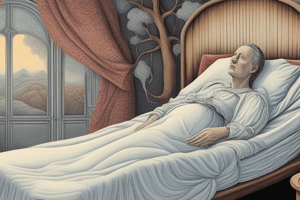Podcast
Questions and Answers
How does serotonin syndrome often resolve within 24 hours?
How does serotonin syndrome often resolve within 24 hours?
By discontinuing the serotonergic agent and initiating care.
What are the five central principles in the management of serotonin syndrome?
What are the five central principles in the management of serotonin syndrome?
Discontinuation of all serotonergic agents, supportive care aimed at normalization of vital signs, sedation with benzodiazepines, administration of serotonin antagonists, assessment of the need to resume use of causative serotonergic agents after resolution of symptoms.
What is the recommended approach for controlling agitation in serotonin syndrome?
What is the recommended approach for controlling agitation in serotonin syndrome?
Sedation with benzodiazepines
What is the antidote for serotonin syndrome?
What is the antidote for serotonin syndrome?
Which antidepressants should be avoided in patients with epilepsy or prone to seizures?
Which antidepressants should be avoided in patients with epilepsy or prone to seizures?
What is the role of ice packs in managing serotonin syndrome?
What is the role of ice packs in managing serotonin syndrome?
What is the rationale behind using pharmacotherapy for depression?
What is the rationale behind using pharmacotherapy for depression?
When should drug treatment be started for depression?
When should drug treatment be started for depression?
What is recommended in addition to drug treatment for depression?
What is recommended in addition to drug treatment for depression?
In what cases should a psychiatrist manage depression?
In what cases should a psychiatrist manage depression?
What factors influence the choice of antidepressant medication?
What factors influence the choice of antidepressant medication?
How effective is psychotherapy alone for treating depression?
How effective is psychotherapy alone for treating depression?
What are the main symptoms of severe major depression?
What are the main symptoms of severe major depression?
What is the primary aim of treatment for severe major depression?
What is the primary aim of treatment for severe major depression?
What are the two main types of psychotherapy mentioned for treating severe major depression?
What are the two main types of psychotherapy mentioned for treating severe major depression?
How common is severe major depression in primary care or community (outpatient) practice?
How common is severe major depression in primary care or community (outpatient) practice?
What is the role of pharmacological intervention in the treatment of moderate to severe depression?
What is the role of pharmacological intervention in the treatment of moderate to severe depression?
What is the main goal of cognitive therapy in treating depression?
What is the main goal of cognitive therapy in treating depression?
Flashcards are hidden until you start studying




